|

|
Clan Thompson Pipe Band
The
Clan Thompson Pipe
Band , representing
Eastern Nova Scotia. In the early spring of 1984, Antigonish piper
Scott Williams was invited to organize a 100-member massed pipe band to
perform during the visit of His Holiness, Pope John Paul II to Halifax
on September 13th and 14th. The event was an unfortunate washout, in
the literal sense of the word, with torrential rains and very cold
temperatures. While most people watched on television from the comfort
of their own living rooms as the historic event unfolded, many
thousands more braved the elements and gathered in the Halifax Commons.
The Papal Visit Pipe Band performed, and the day was a tremendously
moving experience for all who took part.
As the pipers and drummers were packing away their soggy, wet uniforms
for the trip home, Pipe Major Janette Gillis and some of the members of
the Ceňl an Eilean Pipe Band from Pictou County and Cape Breton,
approached Scott and asked if he would teach an adult class that
members from both sides of the Canso Strait could attend. He agreed,
but made it absolutely clear that he was not interested in getting
involved with their pipe band. When the classes began the next week,
only those pipers from Pictou County turned up. Within a few weeks,
more pipers joined them and a few drummers started coming along as
well, under the direction of Sue Ellen Cummings MacDonald. Despite
everyone’s stated intentions, the Clan Thompson Pipe Band was born.
|
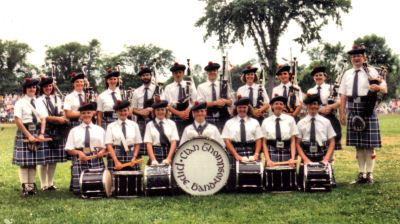
Antigonish Highland Games in 1987 |
The immediate task of finding uniforms was
made easier when surplus Hunting Thompson tartan kilts, brown jackets
and sporrans were acquired from the Ceňl an Eilean Pipe Band. Some
funds were raised to augment these materials and to purchase new drums.
One of the more successful ventures was a series of home delivered ham
and salad suppers. Another was the sponsorship of a softball tournament
in Pictou County. More money was raised selling even-split tickets at
bingos and selling programs at Pictou County High School Hockey games.
The band entered competition for the first time in 1985, playing in the
Grade 3 events, and placing second overall in the Champions Supreme
standings at the end of that very first season.
For the next five years, the band grew in size and went from strength
to strength, placing first or second in every Grade 3 competition in
the Atlantic Provinces, and taking a whole string of minor prizes at
Maxville and Montreal. In 1987, for example, it finished in second
place in the standings for the Grade 3 Champions Supreme.
In 1988, the 28-member band was completely outfitted in a new uniform
consisting of Dress Blue Thompson tartan kilts, legion blue jackets,
balmorals and black sporrans, cream-coloured hose, and black brogues.
Though several of the members purchased their own uniforms, the
remainder were paid for in large part by a very successful “Great
Duckie Race” on the East River, in New Glasgow that drew crowds
estimated at more than three thousand and coverage on the ATV
television network. This fund-raiser was so successful that it was
repeated annually for several years, insuring the band a regular source
of income to help purchase additional uniforms and equipment and to
travel to competitions.
Among the early members of the band were Pipe Major Scott Williams,
Pipe Sergeant Madelyn Evans, pipers Bev Sample Ollerton, Peggy Morrell,
Janette MacLeod, Monique Henderson, Hayley Clarke, Theresa MacDonald,
Scott Long, and Anne MacMillan, Leading Drummer Sue Ellen Cummings
MacDonald, bass drummer Karen Holly, snare drummers Lee Bezanson and
Pam MacGillivray, and tenor drummers Lee Cleveland and Keah Evans.
Others joined in the following years, including pipers Barbara Stewart,
Sandi Roberts, Patricia Vickers, Bill Haslam, Sheila Cameron, Valerie
Cooke, Marilyn O’Brien, Sheila Redden, Sandra MacIsaac, Edward Langille,
Doug Stewart, Dane Grant, Frances Doudelet, and Katerin Basque, as well
as drummers Lianne Bradshaw, Arron Bradshaw, Nancy Sinclair, Donald
Margeson, Kelly Arsenault, and Natalie Alfe.
|
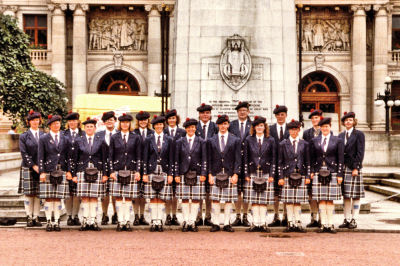
George Square, Glasgow in 1989 |
Despite the apparent good health of the
band,in 1988 Pipe Major Scott Williams and Pipe Sergeant Madelyn Evans
saw that it was becoming increasingly difficult to attract experienced
musicians who had a high level of skill and playing ability, and who
would be dedicated to achieving success in competition at the national
and international level. The band had already attracted all the pipers
and drummers from Antigonish and Pictou Counties and Cape Breton who
could play at the necessary level, but the recent competitive successes
of bands in Metro Halifax had all but dried up that area as a potential
source for additional recruits for Clan Thompson. Madelyn and Scott
decided that, if their band was going to survive, they must begin to
train young pipers locally. Madelyn started classes in Stellarton and
Scott started classes in Antigonish that gradually produced a number of
excellent young pipers, but not in time to save the Clan Thompson Pipe
Band as they had hoped. Though its highest accolades were still a year
away, the band had already begun to slide down that long, slippery
slope.
The Clan Thompson Pipe Band reached its competitive peak in 1989 when
it finally won the Grade III North American Pipe Band Championship in
Maxville, Ontario and the next day placed second at the Montreal
Highland Games. These successes were made possible in large part by the
excellent drum corps then under the direction of Lianne Bradshaw, of
Antigonish, who led her drummers to first place finishes at both
events, acquiring the title of Grade 3 North American Championship Drum
Corps at Maxville.
With these successes behind them, the band travelled on to Scotland
with high hopes for continued victories there. Sadly, the band finished
a disappointing fourteenth in the World Championships in Glasgow. This
was due in large part to an error in time of play printed in the
souvenir program that sent the judges off to lunch in the city,
arriving back more than an hour after the Grade 3 band event was
actually scheduled to start. The Clan Thompson Pipe Band had spent the
morning sheltered from the rain in their bus in a remote part of the
field separated from the other band buses, and the stewards were unable
to find them to advise them of the change in starting time. When the
band reached the peak of its performance preparation and marched in the
rain across the field to the Grade 3 competition circle, instead of
cheering crowds and a panel of judges, they were met by a solitary
steward huddled under an umbrella who told them of the delay, which
would see them have to wait more than an hour and a half before they
eventually played.
Despite
every effort to keep as dry as possible, the band and their fragile
reeds got wetter and wetter. When the sun eventually came out in mid
afternoon, it was enough to send the pitch of their chanters over the
top and they began what proved to be a futile effort to bring them down
again. As they marched up to the line, every piper in the band knew
that, no matter how well they played, the sound of their pipes would
not be good enough to win them the coveted prize.
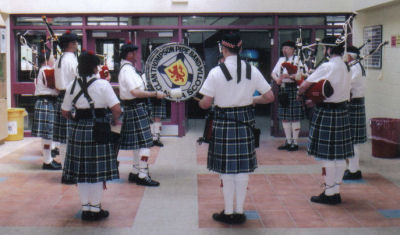
Tuning up at the
Antigonish Indoor Meet, May 2007 |
At the competitions at Perth the next day, the band had recovered a
little bit, and had dried out somewhat, but spirits were still low, and
they placed ninth. After another five days of drying out or replacing
reeds re-established their confidence, however, and the band placed
second at Rothesay, on the Isle of Bute, and finished off their
competitive efforts in Scotland with a fourth place finish in
Dunfirmline. The pipe major of one of their rivals, the Cooper and
District Pipe Band, commented that if the band had sounded as well at
the Worlds, they would have definitely finished “in the money”! That,
at least was some consolation.
During their nineteen-day stay in Scotland, the band made a brief tour
of the Highlands, visiting the Glenfinnan Monument, Eilean Donan
Castle, the Piping Museum at Borreraig, on the Isle of Skye, and the
historic old town of Inverness. They attended the 78th Fraser
Highlanders Pipe Band concert in Edinburgh, and also visited Edinburgh
Castle and Holyrood Palace. In Glasgow, the band performed on George
Square, and was presented with the Coat of Arms of the City of Glasgow
at a reception hosted by the Lord Provost in the City Chambers.
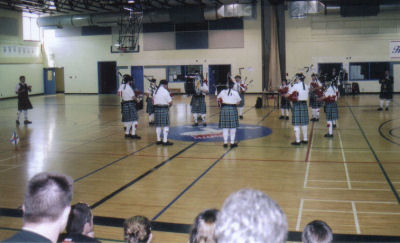
Competing at the
Antigonish Indoor Meet, May 2007 |
Now
ready to advance to the Grade 2 level, the band suffered a tremendous
loss when several pipers and drummers left the area to pursue
educational and employment opportunities elsewhere. Among them was
leading drummer Lianne Bradshaw and her brother Arron, leaving the
band’s new lead drummer, Pam MacGillivray, with a fairly novice snare
section. The pipe section remained strong, and they continued to
compete successfully at the Grade 3 level for the next three years, but
they were unable to advance to the Grade 2 level as they had planned.
In 1990, the band returned to play in Maxville, placing fifth, and in
Montreal, placing second. In 1991, the band was awarded the Grade 3
Champions Supreme award by the NSPPBA, and in 1992, with reduced
numbers, they placed second overall in the Champions Supreme standings.
The membership list submitted to the NSPPBA for that season included:
Pipe Major Scott Williams, piper Sergeant Madelyn Evans, pipers Bev
Sample, Valerie Cooke, Edward Langille, Dane Grant, Janette MacLeod,
and Frances Doudelet, bass drummer Karen Holley, Tenor drummer Nancy
Sample, and snare drummers Pam MacGillivray (lead), Lee Bezanson,
Donald Margeson, Kelly Arsenault and Natalie Alfe.
The band had lost momentum, and the members decided to take a year off
from competition in 1993 in an attempt to give everyone a break from
the hectic schedule of competitions that saw them on the field an
average of nine weekends every summer since 1984. Pipe Major Scott
Williams spent the year in Scotland as an exchange teacher, and when he
returned in the summer of 1994, only eight former members showed up at
a meeting called to reassemble the band. The band finally and
officially broke up in the spring of 1995.
During its time, however, the Clan Thompson
Pipe Band provided many pipers and drummers with the opportunity to
play at a higher standard than had been possible in the region since
the 1970s. It also spawned classes which led to the rise of two very
strong junior bands, the Balmoral Pipe Band of Stellarton and the
Antigonish Highland Society Pipe Band. Some of its members went on to
play with Grade 1 pipe bands in Nova Scotia and Ontario, and two of
them - Scott Long and Dane Grant - went on to record and tour with
internationally renowned Celtic musicians such as Ashley MacIsaac and
MacKeel.
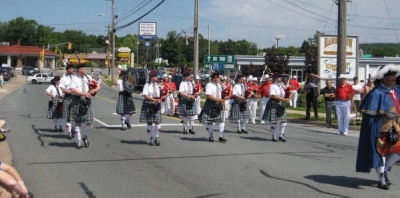
Parade in
Liverpool, NS July 7, 2007 |
In February of 2006, after a lapse of about eleven years, some of the
band’s original members met to discuss the possibility of reviving the
Clan Thompson Pipe Band. It only took a phone call to persuade Pipe
Major Williams to join them and rehearsals began shortly thereafter. A
fairly strong pipe section grew quickly, but it took over a year to put
a drum section together with Owen Muir as lead drummer. The band
appeared in competition for the first time at the Antigonish Indoor
Meet in May 2007, placing 3rd overall in the Grade 4 band event. The
band began accepting engagements, playing parades in Port Hawkesbury,
Westville, Liverpool and Antigonish, a series of five summer evening
concerts at the DeCoste Centre in Pictou, the Antigonish Highland Games
Tattoo, the Festival of the Tartans in New Glasgow, and a private
birthday party in South Side Harbour. Revenue from these engagements
enabled the band to purchase additional drumming equipment and augment
its uniforms. In August, the drum corps began receiving instruction
from Father Neil R. McKenna, formerly the lead drummer of the
internationally acclaimed Antigonish Legion Pipe Band. It is hoped that
the band will be able to make the jump back up to Grade 3 for the 2008
competition season.
|